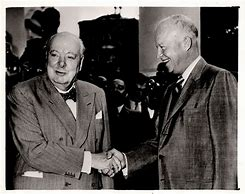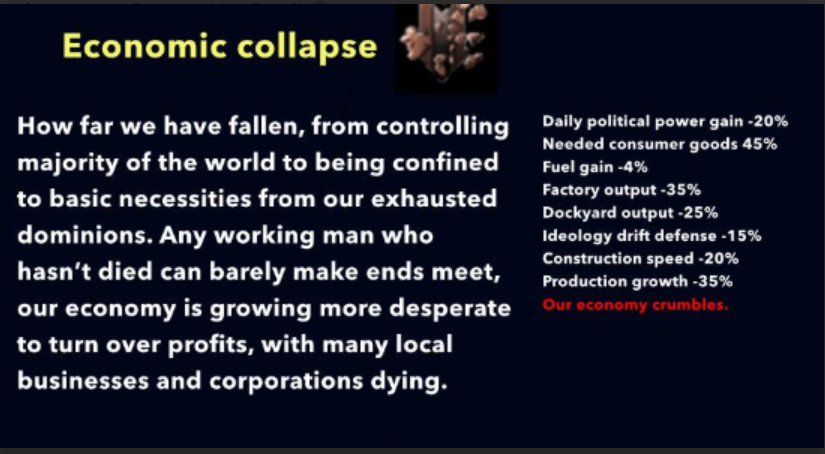Canada and the Entente are about to make the biggest mistake of their lives.
- 1
- 1
Yep. Canada about to experience a shotgun wedding lolCanada and the Entente are about to make the biggest mistake of their lives.







Canada and the Entente are about to make the biggest mistake of their lives.
Yep. Canada about to experience a shotgun wedding lol
Could taking America to war with Canada be just what Landon needs to salvage any hope of re-election?...
In the end, maybe. No president has lost an election during wartime. And even if there hasn’t been a war in the end, we’ve seen how it has gained more popularity among Americans.A short term political win-win for Landon? Either they back down and they get them for free, or there’s a popular limited war. As long as they win it quickly.
That's what I think too. What democracy are they going to defend if they destroy it themselves?Ike is right. The Triumvirate should stay out of democracy as much as possible. And they should definitely not start another coup.
It takes time, lots of time, and peaceful, free transitions of power for democracy to succeed.
Landon may need to go third-party (or independent) if he wants even the slightest chance of getting re-elected...January 22, 1940
George Gallup conducts the first-ever popularity index poll. For Landon, the results show that over 47% of respondents (excluding those in the non-reincorporated territories) approve of his administration's actions. However, only 32% would vote for him in reelection. Meanwhile, MacArthur enjoys a 67% approval rating.
January 24, 1940
Field Marshal Bernard Law Montgomery and General Eisenhower shake hands following the withdrawal of the last Canadian soldier from American territory. Peace and the status quo have been restored. All of North America breathes a sigh of relief. From Alaska to Tampa, Florida, Americans flood the streets to celebrate victory.
View attachment 1250254
Had a feeling it would go that way. It would in the end have proven a very difficult war to sell for the Entente, and an easy one for the US, where the cost could be more easily justified.Canada agrees to withdraw from the occupied territories by January 24
Will he or won’t he? Will this Caesar want to just keep to soldiering instead or have another tilt at politics? It was the latter that killed his namesake, not the many battles he fought.MacArthur enjoys a 67% approval rating

Landon may need to go third-party (or independent) if he wants even the slightest chance of getting re-elected...
Don't get ahead of yourself!
I'm glad Canada saw wisdom and backed down. They need America as a support against the 3I. Getting bogged down in a war against an otherwise friendly force wouldn't have helped that.
Undoubtedly, this war would be pointless for both sides. Let's hope that peace reigns now. Or not?Had a feeling it would go that way. It would in the end have proven a very difficult war to sell for the Entente, and an easy one for the US, where the cost could be more easily justified.
Well, I think I've mentioned this before. It's a possibility. But the Democrats hate and fear him. The Republicans are still fighting among Landon, Dewey, and Taft. The will need some luck.Will he or won’t he? Will this Caesar want to just keep to soldiering instead or have another tilt at politics? It was the latter that killed his namesake, not the many battles he fought.
I hope William eventually gets the chance for a proper proposal. Though his mind now has other priorities...- General MacArthur will pick you up in his car in twenty minutes. I don’t think we’ll be having dinner tonight. You should get ready.
Assassinations never end well, for anyone. Franz Ferdinand's sparked WWI.At that moment, William saw through the window a man in a cap throwing an object toward the car. Before he could say anything, the noise came before the heat. Everything went black.
Someone who is insane. That's one choice. But I don't think this is a Guiteau-Garfield situation.Who could be insane enough to commit such an act?
Indeed it would have.Luckily, Edward saw reason. A war between us would only benefit the Internationale, Germany, and Japan.
What was the date of this attack - not the Ides of March?We’ll have to pray for his recovery.








Without a doubt, Canada and Kim Philby are going to have a tough time. Some of you may see where I’m going with this. If not, it will become clear later on.I think this assassination attempt will end poorly for whoever was behind it...
Well, we all wish for William to be happy. But for now, he should prepare himself. He’s going to have a lot to cover.I hope William eventually gets the chance for a proper proposal. Though his mind now has other priorities...
And the assassination attempt on MacArthur in the American-Canadian War.Assassinations never end well, for anyone. Franz Ferdinand's sparked WWI.
I had to look up the Guiteau-Garfield incident. Undoubtedly, U.S. history is very interesting. Surely, many would benefit from the General being out of action. Luckily, he survived. And it's clear that it was the Canadians who tried to kill him, right?Someone who is insane. That's one choice. But I don't think this is a Guiteau-Garfield situation.
A Syndicalist? Perhaps. Or someone who was made to look like one.
Has the Triumvirate played their hand early? Has Edgar Hoover gone behind Ike's back?
Or, is this the General's own doing? Making himself a martyr through severe injury, but leaving himself just enough alive to benefit.
Now that would be an insane act.
Well, now that I think about it... I don't think it's in Germany's best interest for the only two groups of powers that don't have territorial claims against it to fight each other.Indeed it would have.
Time to be honestWhat was the date of this attack - not the Ides of March?Just curious (if you don’t mind answering the question - was this a game event or dramatic narrative? Enjoyed the interlude, anyway.
Nice use of Philby in an alt context.Wisner had been reassigned to coordinate American guerrillas in New England from across the border. However, he soon realized that his efforts were being thwarted by a journalist: Kim Philby.
Seems pretty likely on the evidence presented.In Winser’s view, the Canadians were behind the assassination attempt.
A major escalation. Of course Hoover authorised it, but he would never do so in writing. I think a "who will grab me of this troublesome agent" moment would have happened with Wisner, plus a nod and a wink.To this day, it remains uncertain whether the administration authorized Hoover’s FBI agents to raid the embassy.
OK, even if with some residual pain, the Caesar survives his drive to the Forum. Luckier than his namesake.General MacArthur had regained consciousness. His surgeries had gone well, and he was on the path to recovery.
Then, around 11 p.m., news arrived of J.P. Morgan’s assassination less than 11 miles from the border. His car was found partially burned, with his body and that of his escort discovered a few meters away, both executed.
Oh, a juicy little teaser there. In the end, the provenance matters less than what was made of it, but it would be interesting to find out conclusively for historical purposes. A few good movies and docos will be made about it, plus a bunch of colourful conspiracy theories for decades to come.the findings of the Carver Commission suggest the true culprits, though that is a story for another time.
Another nice re-purposing of OTL events.On February 31, the merchant ship RMS Lusitania was sunk by an American submarine 200 miles off Halifax, carrying over 2,000 Canadian troops returning from garrison duty in the Caribbean.
Dah, dah, DAAAAHHH!The American-Canadian War had begun.
Thanks for explaining.And that's why I had the AI programmed to NOT return New England to me. It did anyway. But if I wanted to continue the story as I had envisioned, I needed the war. I think the assassination adds a lot more to the story, in addition to having strong ramifications for the future.
So no tax evasion this timeline?Al Capone. After the mob boss’s death in 1934
A nice reference here.On February 31, the merchant ship RMS Lusitania was sunk by an American submarine
Canada is getting that shotgun wedding. The question is, what is Hoover getting from the whole deal? He must have a motive to gain more power but I don't see how.So no tax evasion this timeline?
A nice reference here.
The US has a much shorter border now with New England regained. I don't expect this to go well for Canada. It won't be easy for the US either, but they're more likely ot win.
Edgar Hoover seemed to really want to escalate this into war. For what reason, only he knows...
















Absolutely! I’m really looking forward to July when the national conventions kick off. Who’s going to end up as the nominees? It’s going to be interesting to see how it all plays out!Depending on how long this war with Canada lasts, it might have ramifications for the upcoming election...
Another nice re-purposing of OTL events.
Nice use of Philby in an alt context.
Yes, honestly, I thought it was a good idea. I knew I needed a maritime incident for the war to break out, and I knew it had to be the British who suffered the loss. The name just came naturally. And I was always sure that I wanted Philby to appear in my story. We'll talk more about him later.A nice reference here.
No, not this time. At first, I thought about adding a summary of his fate next to the car, but it ended up being too long. Basically, the syndicalists' influence in Chicago shifts the balance of power there. And while I suppose that Al Capone himself probably wouldn’t have any issues striking a deal with them, there’s also the possibility that a rival gang allied with the unions or someone else to take him out. We could also say that J. Edgar Hoover had a hand in thisSo no tax evasion this timeline?
Canada is getting that shotgun wedding. The question is, what is Hoover getting from the whole deal? He must have a motive to gain more power but I don't see how.
Although we’ll explore this in more detail later, it’s important to clarify that Hoover isn’t the main instigator of the war. While his actions have certainly escalated tensions—most notably, the invasion of a foreign embassy—his primary objective isn’t to provoke a full-scale conflict with the Entente. Rather than being a warmonger, Hoover is an opportunist, always looking for ways to expand his power and the influence of the FBI.Edgar Hoover seemed to really want to escalate this into war. For what reason, only he knows...
Uh oh, are the Canadian people going to give the Windsors the Romanov treatment?
Landon should push for an unconditional victory, it's his best chance of securing re-election.With the war nearing its final stages, the question remained: would Washington accept these terms, or would the United States push for a total and unconditional victory?
And Julius Caesar is said to have said something similar, though I forget the context. MacArthur knows his history.MacArthur is said to have laughed and remarked that he was not a king but rather a Caesar.
Washington has the momentum, they have the right to force their own terms upon Canada. Churchill's proposal is going to be rejected by all factions I think. A fellow republican government in Canada is more friendly to the US than an autocratic one.With the war nearing its final stages, the question remained: would Washington accept these terms, or would the United States push for a total and unconditional victory?
